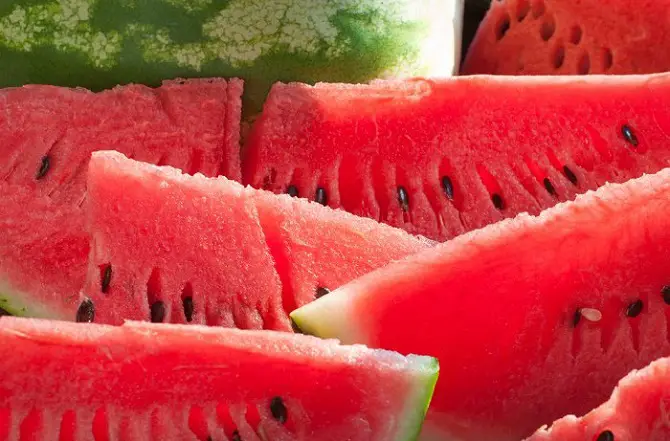Watermelon is the perfect food for summer. They are delicious, low in calories, full of nutrients and super hydrating. This makes watermelon a fruit you should eat every day and make part of your regular diet. It’s not just something delicious to do, but will also give you a ton of health benefits.

12 healthy reasons to eat watermelon every day
The benefits of watermelon improve heart health, boosting brain function and reactivating the immune system. But there are many more reasons to eat watermelon. Keep reading our article to discover why watermelon should never be missing from our kitchen.
1. Healthy heart
Eating large amounts of watermelon improves cardiac function. Watermelon contains high levels of a remarkable antioxidant called lycopene (which gives it its red color). Lycopene keeps your heart young and prevents damage caused by free radicals. Along with lycopene, watermelon contains high levels of potassium which cut the risk of heart attack, help reduce cholesterol, improve blood flow and regulates heartbeat.
2. Strong bones
Lycopene in the diet (also found in tomatoes) has been shown to promote healthy bones. This powerful antioxidant reduces the activity of the bones cells implicated in the development of osteoporosis. And its high levels of potassium help retain calcium, which keeps your bones and joints healthy and strong.
3. Boosts the immune system and speeds healing
Watermelon contains high levels of vitamin C. Vitamin C strengthens the immune system and protects the body against free radicals and oxidative stress. Vitamin C also plays an important role in healing injuries. The enzymes that are involved in collagen production need vitamin C. So if your wounds aren’t healing like they should, increase your intake of vitamin C with foods like watermelon and citrus fruits.
4. Helps with weight loss
Watermelon is made up of about 90% water and is very low in calories, which makes it a great fruit for people who want to lose weight. But its low calories aren’t the only reason to eat watermelon regularly to lose weight. Citrulina is also found in watermelon, which is converted to arginine, an amino acid that has fat burning effects.
5. Anti-inflammatory properties
Watermelon is rich in flavonoids, carotenoids (such as lycopene) and triterpenoids. The lycopene in watermelon in particular has shown great results in the reduction of inflammation and neutralization of free radicals. Make sure you get ripe watermelon, since they have a higher concentration of these anti-inflammatory compounds.
6. Prevents cancer
Once again, lycopene steals the show. This powerful carotenoid is shown to reduce the risk of prostate cancer, breast cancer, lung cancer, uterine cancer and colon cancer.
7. Alkalizes the body
These days our diets are full of acidic foods (meat, dairy, baked goods, processed foods and fast food). Diets high in acid are related to weight gain and an increased risk of developing diseases like cancer, type 2 diabetes, Alzheimer’s and heart disease. Ripe watermelon is very alkaline and helps the body neutralize these harmful and damaging acids.
8. Healthy muscles and nerves
Watermelon is a good source of potassium and citrulina to keep your muscles and nerves functioning correctly. It controls muscle contraction and prevents muscle pain after hard exercise. Our body converts citrulina into arginine, which helps relax blood vessels and improves blood circulation.
9. Improves vision
Eating a lot of watermelon is good for eye health, due to its high levels of antioxidants such as beta carotene, vitamin C, lutein, and zeaxanthin. These protect your eyes from age related problems, such as night blindness, macular degeneration and glaucoma.
10. Skin and hair
Watermelon contains a good amount of beta carotene, which is converted into vitamin A. Vitamin A plays an important role in the production of sebum and cellular growth for keeping skin and hair healthy and hydrated.
11. Hydrates your body
Watermelons are roughly 90% water and are filled with beneficial electrolytes. So, eating watermelon daily can help prevent dehydration, especially during the summer.
12. Makes your mind sharp and improves your mood
Watermelons contain a good amount of vitamin B6. Vitamin B6 is necessary for the production of several chemical products in the brain that are responsible for mood and behavior (serotonin, dopamine, norepinephrine, and gamma amino butyric acid, or GABA). Imbalances can cause mood changes, anxiety, depression and Parkinson’s disease. According to the National Institutes of Health, low levels of vitamin B6 can also play a role in reduced short-term memory, making watermelon perfect for students.
Watermelon seeds are also edible and are full of benefits
Most people don’t eat watermelon seeds or opt for seedless watermelons. Watermelon seeds are a rich source of proteins and have their own beneficial phytonutrients to keep your body health.

